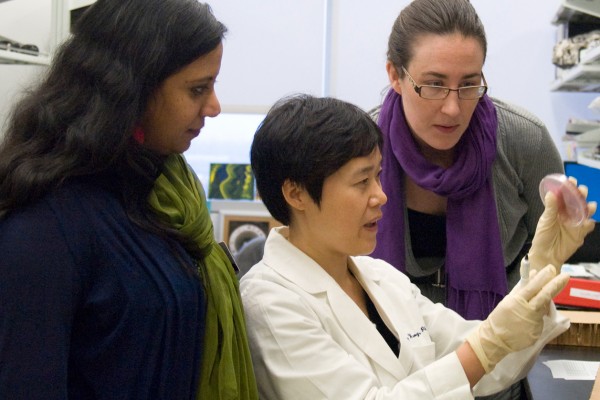Soil bacteria may provide clues to curbing antibiotic resistance
Bacteria that naturally live in the soil have a vast collection of genes to fight off antibiotics, but they are much less likely to share these genes than infectious bacteria, a new study by researchers at the School of Medicine has revealed. Shown is senior author Gautam Dantas, PhD.
$32 million NIH grant funds study of multipurpose infection fighter
A multi-institutional campaign to harness a newly recognized cellular defense against infection is being led by researchers at the School of Medicine. A $32 million grant from the National Institutes of Health is funding the collaborative, which could lead to drugs with unprecedented versatility in fighting different infections. Washington University’s Herbert W. Virgin IV, MD, PhD, is the principal investigator.
In children with fever, gene profiling distinguishes bacterial from viral infections
Researchers have shown they can distinguish between viral and bacterial infections in children with fever by profiling the activity of genes in a blood sample.
Bacteria may contribute to premature births, STDs
New research at the School of
Medicine points to a common species of bacteria as an
important contributor to bacterial vaginosis, a condition linked to
preterm birth and increased risk of sexually transmitted diseases. Pictured is a single cell of the bacteria that may be causing the problem, Gardnerella vaginalis.
Study may explain why some people get pimples
In a boon for teenagers everywhere, scientists have discovered there are “bad” strains of acne bacteria associated with pimples and “good” strains that may protect the skin.
Estrogen fights urinary infection in mouse study
Estrogen levels drop dramatically in menopause, a time when the risk of urinary tract infections increases significantly. Researchers at Washington University School of Medicine in St. Louis
have found new evidence in mice that the two phenomena are connected by
more than just timing.
Bloodstream infections in ICUs cut by 44 percent
A major study in hospital intensive care units (ICUs) shows that bathing patients daily with an antimicrobial soap and applying antibiotic ointment to the nose reduced by 44 percent the bloodstream infections caused by dangerous pathogens, including the drug-resistant bacteria MRSA.
Human and soil bacteria swap antibiotic-resistance genes
Soil bacteria and bacteria that cause human diseases
have recently swapped at least seven antibiotic-resistance genes,
researchers at Washington University School of Medicine report on Aug.
31 in Science.
Key signal prepares immune cells to defend skin, brain
Scientists at Washington University School of Medicine
in St. Louis have identified the molecular signal that triggers the
development of immune cells that patrol the skin and brain.
Urinary tract infections steal from hosts’ defense arsenals
Humans have known for centuries that copper is a potent weapon against infection. New research shows that the bacteria that cause serious urinary tract infections “know” this, too, and steal copper to prevent the metal from being used against them. Blocking this thievery with a drug may significantly improve patients’ chances
of fighting off infections, according to researchers.
View More Stories

